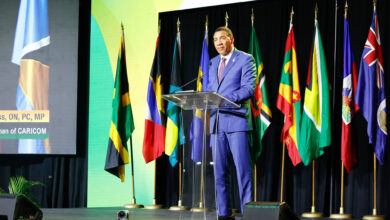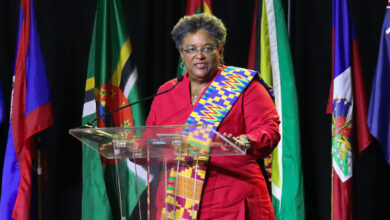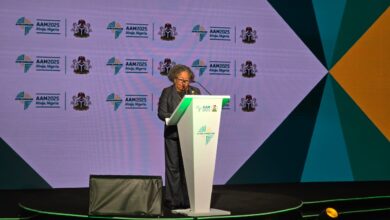The Caribbean Community takes great pleasure in welcoming to Guyana and in particular to the headquarters of the Caribbean Community Secretariat, the participants in this Ibero-American and Caribbean Workshop on South-South Cooperation.
The Community is pleased to be associated with the hosting of this collaborative effort between the Ibero-American countries and the Caribbean. The distribution of national participation in this event signifies the importance that the Latin American and Caribbean Countries (LAC) place on the ever growing cooperation among Southern countries. The presence here today of representatives of more than 20 countries, across both sub-regions, speaks for itself.
Our countries are at various stages of development and are all classified as developing. The mission for all of us is to provide greater opportunities and an improved quality of life for our citizens. In striving after this vision, it is important that we cooperate among ourselves sharing experiences and expertise that will allow the achievement of sustainable developments, alleviation of poverty. There are important developmental success stories among the countries of the South which are worthy of emulation by all. The sharing of expertise and experience gained in their development journey could be invaluable to other developing countries.
Much of LAC is now regarded as middle income countries (MICs) resulting in a shrinking of development aid flows to the region. This situation is made worse by the policy of using per capita income as the criterion to graduate many of our countries out of access to concessional development financing. The share of ODA destined to the LAC region has fallen from 10% of total flows in 2000-2001 to 8% in 2010-2011. This trend is expected to continue due to progress in economic growth and poverty reduction in LAC, recent economic misfortunes in most traditional donor countries, and an increasing prioritisation of aid focus to other regions.
Despite the progress that has been made in Latin America and the Caribbean, it is clear that sustainable development of many of the countries cannot be attained without external assistance. It is therefore imperative for us to look for effective and efficient mechanisms and solutions to counteract the reducing developmental assistance from our traditional donor partners. In this context, the South-South Cooperation (SSC) mechanism with its emphasis on knowledge sharing is likely to be central to ensuring continued development among the countries of Latin America and the Caribbean.
We note that many Latin American countries have been pioneers in engaging in SSC and several of these countries have active international development agencies whose methodology is based primarily on SSC. The Caribbean Community must express its appreciation for assistance received from countries such as Chile, Mexico, Brazil, Cuba, Venezuela and Colombia, to name a few.
The principles of SSC are deeply infused into the development of the Caribbean Community’s integration movement. The sharing of expertise and best practices is an institutionalised aspect of our integration efforts as we seek convergence in our development. Routinely, expertise is shared or sourced to address development issues in requesting Member States. In implementing the CARICOM Single Market and Economy (CSME), model legislation and regulations are drafted centrally with consultations with Member States and then disseminated for national adoption. Much of this sharing is done through made-for-purpose institutions designed to be the repository of specialised expertise that is available to all Members of the Community.
We, of course, recognise the challenge that provision of experts must often be complemented by financing for ancillary costs. We are therefore pleased that SSC is gaining traction with traditional donors through triangular cooperation schemes which have proven to be an efficient mechanism for delivery of development aid.
In closing, it is my hope that the deliberations over the next two days will be fruitful, will strengthen the ties between the countries present, and produce the basis for the development of a framework for cooperation between the Ibero-American countries and the Caribbean.






